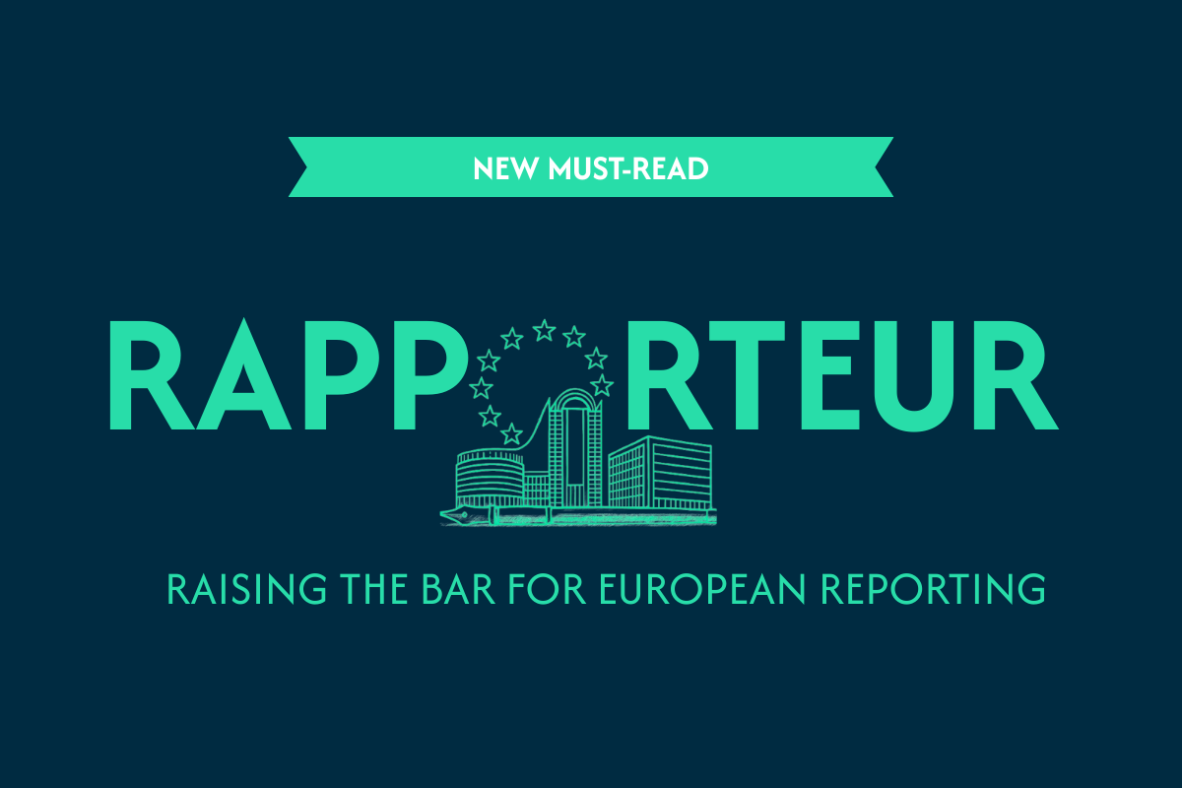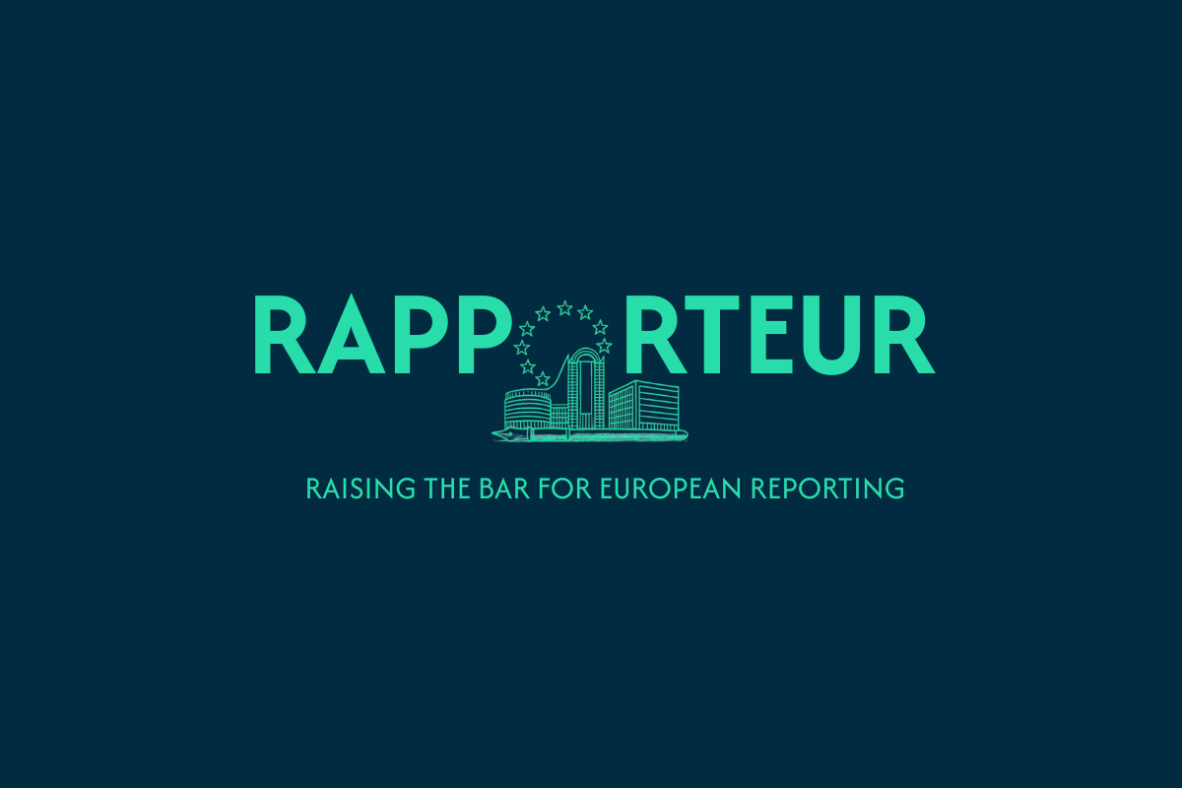Introducing Rapporteur
In today’s edition: the EU condemns Russia’s “intentional” drone incursion into Polish airspace, Emmanuel Macron appoints Sébastien Lecornu as prime minister, and Ursula von der Leyen floats tougher sanctions against Israel over Gaza

Welcome to Rapporteur, a new free daily newsletter about Europe by me, Eddy Wax. This is the first edition, I hope you like it.
I’ve spent seven years in Brussels reporting on the EU and I’m excited to welcome you to this new home for my journalism – and a launchpad for the work of more than 60 Euractiv colleagues around the world.
Though I think I speak OK French (for an Englishman), I only just found out that “rapporteur” – a key piece of European Parliament jargon – also means “snitch.
”So, wearing that as a badge of honour, I promise to be your snitch inside the European institutions, hand-delivering the freshest and most essential reports at 7 a.m. to start your day in Europe fully up to speed. On Fridays, Nicoletta Ionta will take the lead.
Need-to-knows:
- Poland: EU condemns Russia’s “intentional” drone incursion into Polish airspace
- France: Emmanuel Macron appoints Sébastien Lecornu as prime minister
- Gaza: Ursula von der Leyen floats tougher sanctions against Israel
Today’s edition is powered by the European Commission
Big breakthroughs begin with bold ideas. Join us at the European Research and Innovation Days 2025 with Commissioner Ekaterina Zaharieva on 16 and 17 September for two days of debate, live testimonials and forward-looking sessions on the future of European competitiveness and resilience. Be part of shaping EU policy!
In the capital
There have been three Ursula von der Leyens since she took power in 2019.
In the early years, she proposed a heap of new laws on climate and the environment. Then came the pre-election phase, when she scrapped and simplified them. In her State of the Union speech on Wednesday, a new era dawned: proposing things she knows will never fly. And that’s not a joke about a wall of drones.
Her package of punitive measures against Israel – suspending trade, sanctioning extremist ministers and more – grabbed the headlines in a speech light on fresh legislative proposals and heavy on wartime rhetoric.
Because of the obstinance of Germany and Italy, the EU has yet to even green-light the relatively modest proposal von der Leyen made in July, to partially suspend Israeli companies from the Horizon research programme.
She knows her tougher measures are unlikely to become reality. Just listen to Kaja Kallas, who said from the same podium on Tuesday: “There is no unity on what should come next.”
It’s the same story with her near-impossible idea to reform EU voting rules. If it sounds familiar, it’s because she first floated it back in her State of the Union speech, in 2020.
Her Israel measures weren’t entirely without political risk. Just look at the visceral backlash from her own German centre-right, and the gulp-inducing response from Israel. But they were more about strategically placating resentment on the left side of the spectrum than about their real targets.
So why propose them? Why now? To hear her Spanish socialist colleague Teresa Ribera, it was thanks to her. But it’s not even clear if the measures – not yet legally proposed – have the support of the full College of Commissioners, who are still to discuss them.
The answer: von der Leyen, facing fresh censure votes from the far right and far left, aimed to keep the Socialists onside by making largely risk-free concessions. The goal was to head off criticism from MEPs preparing to vote in the coming weeks on laws underpinning the unpopular EU-US trade deal. (In more good news for the centre left, the European Council is preparing to tackle the bloc’s housing crisis in late October, per a draft agenda).
It seems to have worked. Socialist leader Iratxe García, moved to tears by von der Leyen’s tribute to Ukrainian children, softened her tone on the trade deal in an interview after the speech.
Asked whether she would block it, she didn’t give a straight answer, but leaned toward no. “I said that we are against, but we want to be constructive,” she told Rapporteur’s Nicoletta Ionta.
It was a significant climbdown: from “no” to “let’s see how the negotiations go.”
Now read this sharp take by Ilana Bet-El on why von der Leyen must swap out imperial instincts for teamwork.
EU accuses Russia of deliberate drone provocation
Kallas put out an EU statement last night, accusing Russia of an “intentional violation of the airspace of an EU member state” and of a “serious escalation.” NATO allies shot down at least three drones in its skies during a Russian air attack on western Ukraine yesterday, and invoked NATO’s Article 4, a consultative step before any decision on action is taken. Moscow has rejected accusations it was deliberate.
NATO chief Mark Rutte did not say that the attack was deliberate, and neither did Slovakia’s Robert Fico, albeit probably for different reasons. Slovakia, however, signed up to the Kallas statement.
Friedrich Merz said last night that Russia had “seriously endangered human lives,” and that the incident was in line with Russian provocations on NATO’s eastern flank. He also said NATO’s air defence functioned, but “not well enough” to stop the drones.
“What’s with Russia violating Poland’s airspace with drones?” Donald Trump said, as Matt Whitaker, his ambassador to NATO, vowed to “defend every inch of NATO territory.”
Who is Sébastien Lecornu?
The 39-year-old, appointed yesterday as France’s fifth prime minister in just two years, has long been one of Macron’s most trusted allies. Having survived seven cabinet reshuffles, he is now tasked with negotiating a budget in a parliament where the far left and far right are threatening to challenge the government with no-confidence votes and new elections. Read Laurent Geslin’s profile here.
Council is jealous of closer Commission-Parliament ties
EU ambassadors criticised a new cooperation agreement between the Commission and Parliament, at a closed-door meeting on Wednesday. According to one EU diplomat, France, Poland, Greece, Hungary, Portugal, and the Netherlands, all had bad things to say about the arrangement, though they had only learned about it from media reporting (we were the first to write about it). National governments are concerned the agreement upsets the balance of powers between the institutions, as set out in EU treaties.
You can read the legal text, exclusively obtained by Rapporteur, here.
Paper MEPs
Von der Leyen ignored a Bulgarian MEP’s plea on Wednesday to reject “false” reports that her plane experienced GPS jamming during a recent flight to Plovdiv.
“In this complex geopolitical situation, any misinformation can lead to dangerous consequences and reactions,” Elena Yoncheva, a liberal lawmaker who has extensive experience as a war reporter, told her in Parliament. Yoncheva urged the Commission chief to “confirm there was no safety problem” on her flight.
Von der Leyen said she had heard MEPs “loud and clear” – but did not elaborate. The Commission is also relying on sheer bloody-mindedness to push through its agenda.
A press conference would be a fine thing
Teresa Ribera denied reports that she was blocked from making a public appearance to announce the EU’s €2.95 billion antitrust fine on Google last Friday. She told Spanish media in Strasbourg that the fine “spoke for itself” and didn’t require her presence. Ribera also denied tensions with her boss, von der Leyen, after her recent comments on Gaza.
American energy
US Energy Secretary Chris Wright meets his EU counterpart Dan Jørgensen in Brussels today. Looming large is Wright’s claim that Denmark’s beloved wind turbines have impoverished Europeans. Oh and also, the EU’s pledge to buy $750 billion worth of energy products in the next three years.
Work hard, play hard
Roxana Mînzatu, Romania’s EU commissioner, will attend the LEGO campus in Denmark today, as part of a meeting of education ministers. On a group tour, the politicians will “experience first-hand how playful approaches and innovative learning environments can foster creativity, engagement and deeper understanding.”
From the Capitals
PARIS: More than 800 protests took place across France on the first day of the “Let’s Block Everything” movement, which emerged over the summer on social media in opposition to looming budget cuts. The demonstrations were largely peaceful, though several motorways and railway lines were briefly blocked. Outgoing Interior Minister Bruno Retailleau again accused “the far-left movement” of having “hijacked” the protest. Police said 400 people were arrested.
MADRID: Begoña Gómez, wife of Spain’s socialist PM Pedro Sánchez, has been summoned to testify for a fourth time in a corruption inquiry that already brought charges of misusing public funds over her hiring of a personal adviser. The High Court here is also reviewing accusations of influence peddling and business corruption tied to her work at Complutense University. Conservatives accuse Sánchez of deflecting with foreign policy, while he dismissed the claims as provocations.
BERLIN: The Social Democratic Party nominated Sigrid Emmenegger to fill a vacant seat on Germany’s top court, after its original candidate withdrew amid a political storm. Frauke Brosius-Gersdorf had faced a barrage of online attacks from the right wing over her liberal views on abortion, straining ties with the SPD and its coalition partner, the Christian Democrats. Emmenegger currently serves on Germany’s highest administrative court.
ROME: Industry Minister Adolfo Urso warned that Europe’s car sector needed “an immediate shock of reforms,” describing a planned strategic dialogue in Brussels on Friday as “the day of truth.” Responding to von der Leyen’s State of the Union speech, he criticised the Commission’s signals as “too timid” and pressed for sweeping, pragmatic measures that harness all available technologies.
Also on Euractiv
Commission’s budget tsar under fire for ‘Trumpian’ power grab
The executive’s €2 trillion budget plan for the bloc’s next long-term budget has few fans outside Brussels. It looks like a centralisation drive disguised as reform. Regions call it a “Trumpian” bill that cuts subsidies while pulling cash for defence and competitiveness. MEPs are unhappy that their budgetary role is being sidelined. The Commission’s budget chief, Stéphanie Riso, insists Parliament’s authority would grow and acknowledged there’s a lot of misunderstandings to clear up.
Swapping football for fishing, why some in Spain are heading out to sea
On the deck of a tuna boat somewhere in the Pacific Ocean, a 25-year-old Spaniard sends voice notes about his life at sea. In Barcelona, a young woman fights to keep her family’s battered boat afloat, derided by her friends and overlooked by policymakers. Together, they stand as outliers in Europe’s fishing industry, which is ageing rapidly, shrinking year by year, and awaiting a Brussels “generational renewal strategy.”
Agenda
- Commissioner Šuica meets Morocco’s Foreign Affairs Minister Bourita in Rabat
- The Conference of Presidents meets in the European Parliament
- Commissioners Hansen and Šefčovič head to India for new round of trade talks
Contributors: Magnus Lund Nielsen, Thomas Møller-Nielsen, Aurélie Pugnet, Nikolaus J. Kurmayer, Martina Monti, Sofia Sanchez Manzanaro, Alessia Peretti, Nick Alipour, Inés Fernández-Pontes
Editors: Christina Zhao, Sofia Mandilara
Correction: We underestimated the age of Sébastien Lecornu by one year. He is, in fact, 39.




